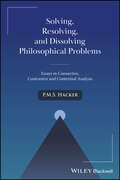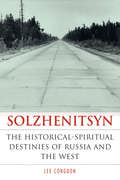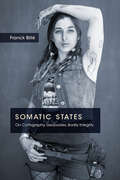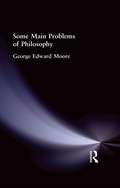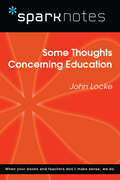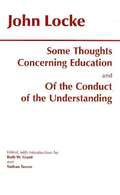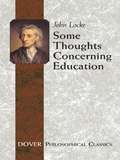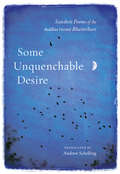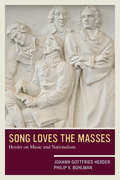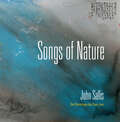- Table View
- List View
Solving, Resolving, and Dissolving Philosophical Problems: Essays in Connective, Contrastive and Contextual Analysis
by P. M. HackerEquips readers with the intellectual tools required to tackle perennial philosophical problems Solving, Resolving, and Dissolving Philosophical Problems is addressed to all who are interested in philosophical questions. It presupposes little philosophical knowledge, only curiosity and an open mind. It demands a willingness to learn not doctrine but method, and the courage to suspend judgement and to challenge received ideas. Advocating the method of the 3 C-s: Connective, Contrastive, and Contextual Analysis, the book demonstrates the method by putting it to work — examining fifteen salient philosophical questions that concern all thinking people. It is organized thematically into four parts. Part I introduces questions in philosophy of psychology (the nature of the mind; the mind/body problem; the nature of consciousness and its demystification; knowledge of other minds). Part II deals with epistemological questions (knowledge, belief; memory; imagination, thinking; dreaming). Part III deals with value (the roots of morality; the nature of good and evil; the need for a secular conception of the soul; happiness). The application of the method in the essays produces striking, original and unanticipated results that will give readers pause. The final part of the book articulates in detail the methodology of the 3 C-s exemplified by the fifteen essays and defends it against objections. Solving, Resolving, and Dissolving Philosophical Problems: On the Methodology of Connective, Contrastive, and Contextual Analysis is an excellent textbook for undergraduate students in introductory philosophy courses alongside more advanced scholars, as well as an invaluable resource for educated general readers with an interest in philosophical methodology.
Solzhenitsyn: The Historical-Spiritual Destinies of Russia and the West (NIU Series in Slavic, East European, and Eurasian Studies)
by Lee CongdonThis study of Aleksandr Solzhenitsyn (1918–2008) and his writings focuses on his reflections on the religiopolitical trajectories of Russia and the West, understood as distinct civilizations. What perhaps most sets Russia apart from the West is the Orthodox Christian faith. The mature Solzhenitsyn returned to the Orthodox faith of his childhood while serving an eight-year sentence in the GULag Archipelago. He believed that when men forget God, communism or a similar catastrophe is likely to be their fate. In his examination of the author and his work, Lee Congdon explores the consequences of the atheistic socialism that drove the Russian revolutionary movement. Beginning with a description of the post-revolutionary Russia into which Solzhenitsyn was born, Congdon outlines the Bolshevik victory in the civil war, the origins of the concentration camp system, and the Bolsheviks' war on Christianity and the Russian Orthodox Church. He then focuses on Solzhenitsyn's arrest near the war's end, his time in the labor camps, and his struggle with cancer. Congdon describes his time in exile and increasing alienation from the Western way of life, as well as his return home and his final years. He concludes with a reminder of Solzhenitsyn's warning to the West—that it was on a path parallel to that which Russia had followed into the abyss. This important study will appeal to scholars and educated general readers with an interest in Solzhenitsyn, Russia, Christianity, and the fate of Western civilization.
Somatic States: On Cartography, Geobodies, Bodily Integrity
by Franck BilléIn Somatic States, Franck Billé examines the conceptual link between the nation-state and the body, particularly the visceral and affective attachment to the state and the symbolic significance of its borders. Billé argues that corporeal analogies to the nation-state are not simply poetic or allegorical but reflect a genuine association of the individual body with the national outline—an identification greatly facilitated by the emergence of the national map. Billé charts the evolution of cartographic practices and the role that political maps have played in transforming notions of territorial sovereignty. He shows how states routinely and effectively mobilize corporeal narratives, such as framing territorial loss through metaphors of dismemberment and mutilation. Despite the current complexity of geopolitics and neoliberalism, Billé demonstrates that corporeality and bodily metaphors remain viscerally powerful because they offer a seemingly simple way to apprehend the abstract nature of the nation-state.
Some Main Problems of Philosophy
by Moore, George EdwardFirst published in 2002. Routledge is an imprint of Taylor & Francis, an informa company.
Some Thoughts Concerning Education (SparkNotes Philosophy Guide)
by SparkNotesSome Thoughts Concerning Education (SparkNotes Philosophy Guide) Making the reading experience fun! SparkNotes Philosophy Guides are one-stop guides to the great works of philosophy–masterpieces that stand at the foundations of Western thought. Inside each Philosophy Guide you&’ll find insightful overviews of great philosophical works of the Western world.
Some Thoughts Concerning Education and Of The Conduct Of The Understanding
by John LockeThis volume offers two complementary works, unabridged, in modernised, annotated texts -- the only available edition priced for classroom use. Ruth W. Grant and Nathan Tarcov provide a concise introduction, a note on the texts, and a select bibliography.
Some Thoughts Concerning Education: Including Of the Conduct of the Understanding
by John LockeIn the influential essays included in this volume, the renowned English philosopher John Locke (1632-1704) advocated a more "modernized" course of education. Focusing on the curriculum, the stimulation of children's interests and imagination, and the function of play, he showed how to instill virtue and morality in children, rather than merely pumping them full of information and facts. <p><p> From the ineffectiveness of physical punishment to the best methods of teaching foreign languages and table manners, these essays comprise an enlightened view of childhood and education that revolutionized educational theory. Locke stressed the teaching of rational thinking, moral dependability, and social grace in the classroom, with the aim of helping students to not only reflect but take action. Locke's writings on education are enlightening reading for philosophy students, teachers, and for anyone interested in educational reform.
Some Turns of Thought in Modern Philosophy: Five Essays
by George SantayanaThis work contains five essays on modern philosophy entitled: Locke and the Frontiers of Common Sense; Fifty Years of British Idealism; Revolutions in Science; A Long Way Round to Nirvana; The Prestige of the Infinite.
Some Unquenchable Desire: Sanskrit Poems of the Buddhist Hermit Bhartrihari
by BhartrihariAn award-winning translator finds surprisingly modern themes in a selection of erotic and religious stanzas from one of classical India's most celebrated poets.Although few facts are known about his life, the Indian poet Bhartrihari leaps from the page as a remarkably recognizable individual. Amidst a career as a linguist, courtier, and hermit, he used poetry to explore themes of love, desire, impermanence, despair, anger, and fear. “A thousand emotions, ideas, words, and rhythmic syllables stormed through him,” writes translator Andrew Schelling in an evocative introduction. “In particular he shows himself torn between sexual desire and a hunger to be free of failed love affairs and turbulent karma.” Schelling’s translation represents a rare opportunity for English-language readers to become acquainted with this fascinating poet. Attuned to Bhartrihari’s unique poetic sensibility, Schelling has produced a compelling, personally curated set of translations.
Some We Love, Some We Hate, Some We Eat [Second Edition]: Why It's So Hard to Think Straight About Animals
by Hal HerzogA maverick scientist who co-founded the field of anthrozoology offers a controversial, thought-provoking, and unprecedented exploration of the psychology behind the inconsistent and often paradoxical ways we think, feel, and behave towards animals. How do we reconcile our love for cats and dogs (and rabbits, snakes, hamsters, gerbils, and goldfish) with our appetite for hamburgers and chicken breast and our use of medications that have been tested on lab mice? Why do so many of us—as meat eaters, recreational hunters and fishermen, and visitors of zoos and circuses—take the moral high ground when it comes to condemning activities like cockfighting? And why are dogs considered pets in America but dinner in Korea? With Some We Love, Some We Hate, Some We Eat, Hal Herzog offers a lively and deeply intelligent look inside our complex and often paradoxical relationships with animals. Drawing on over two decades of research in the interdisciplinary field of anthrozoology, the science of human-animal relations, Herzog examines the moral and ethical decisions we all face when it comes to the furry and feathered creatures with whom we share this planet. Alternately poignant and laugh-out-loud funny, Some We Love, Some We Hate, Some We Eat takes readers on a highly entertaining and illuminating journey through the full spectrum of human-animal relations, relating Dr. Herzog’s groundbreaking research on animal rights activists, cockfighters, professional dog show handlers, veterinary students, biomedical researchers, and circus animal trainers. Through psychology, history, biology, sociology, cross-cultural analysis, current animal rights debates, and the morality and ethics surrounding the use and abuse of animals, Herzog carefully crafts a seamless narrative composed of real life anecdotes, academic and scientific research, cross-cultural examples, and his own sense of moral confusion. Combining the intellectual rigor of Michael Pollan’s The Omnivore’s Dilemma with the wry observation of Bill Bryson’s A Walk in the Woods, Herzog offers a refreshing new perspective on our lives with animals—one that will forever change the way we look at our relationships with other creatures and, in so doing, will also change the way we look at ourselves.
Some We Love, Some We Hate, Some We Eat: Why It's So Hard to Think Straight About Animals
by Hal Herzog“Everybody who is interested in the ethics of our relationship between humans and animals should read this book.”—Temple Grandin, author of Animals Make Us HumanHal Herzog, a maverick scientist and leader in the field of anthrozoology offers a controversial, thought-provoking, and unprecedented exploration of the psychology behind the inconsistent and often paradoxical ways we think, feel, and behave towards animals. A cross between Michael Pollan’s The Omnivore’s Dilemma and Bill Bryson’s A Walk in the Woods, Some We Love, Some We Hate, Some We Eat, in the words of Irene M. Pepperberg, bestselling author of Alex & Me, “deftly blends anecdote with scientific research to show how almost any moral or ethical position regarding our relationship with animals can lead to absurd consequences.”
Someone Has to Fail: The Zero-Sum Game of Public Schooling
by David F. LabareeWhat do we really want from schools? Only everything, in all its contradictions. Most of all, we want access and opportunity for all children—but all possible advantages for our own. So argues historian David Labaree in this provocative look at the way “this archetype of dysfunction works so well at what we want it to do even as it evades what we explicitly ask it to do.” Ever since the common school movement of the nineteenth century, mass schooling has been seen as an essential solution to great social problems. Yet as wave after wave of reform movements have shown, schools are extremely difficult to change. Labaree shows how the very organization of the locally controlled, administratively limited school system makes reform difficult. At the same time, he argues, the choices of educational consumers have always overwhelmed top-down efforts at school reform. Individual families seek to use schools for their own purposes—to pursue social opportunity, if they need it, and to preserve social advantage, if they have it. In principle, we want the best for all children. In practice, we want the best for our own. Provocative, unflinching, wry, Someone Has to Fail looks at the way that unintended consequences of consumer choices have created an extraordinarily resilient educational system, perpetually expanding, perpetually unequal, constantly being reformed, and never changing much.
Something Happened: A Political and Cultural Overview of the Seventies
by Edward BerkowitzIn both the literal and metaphorical senses, it seemed as if 1970s America was running out of gas. The decade not only witnessed long lines at gas stations but a citizenry that had grown weary and disillusioned. High unemployment, runaway inflation, and the energy crisis, caused in part by U.S. dependence on Arab oil, characterized an increasingly bleak economic situation. As Edward D. Berkowitz demonstrates, the end of the postwar economic boom, Watergate, and defeat in Vietnam led to an unraveling of the national consensus. During the decade, ideas about the United States, how it should be governed, and how its economy should be managed changed dramatically. Berkowitz argues that the postwar faith in sweeping social programs and a global U.S. mission was replaced by a more skeptical attitude about government's ability to positively affect society.From Woody Allen to Watergate, from the decline of the steel industry to the rise of Bill Gates, and from Saturday Night Fever to the Sunday morning fervor of evangelical preachers, Berkowitz captures the history, tone, and spirit of the seventies. He explores the decade's major political events and movements, including the rise and fall of détente, congressional reform, changes in healthcare policies, and the hostage crisis in Iran. The seventies also gave birth to several social movements and the "rights revolution," in which women, gays and lesbians, and people with disabilities all successfully fought for greater legal and social recognition. At the same time, reaction to these social movements as well as the issue of abortion introduced a new facet into American political life-the rise of powerful, politically conservative religious organizations and activists.Berkowitz also considers important shifts in American popular culture, recounting the creative renaissance in American film as well as the birth of the Hollywood blockbuster. He discusses how television programs such as All in the Family and Charlie's Angels offered Americans both a reflection of and an escape from the problems gripping the country.
Sometimes Always True: Undogmatic Pluralism in Politics, Metaphysics, and Epistemology
by Jeremy BarrisSometimes Always True aims to resolve three connected problems. First, we need an undogmatic pluralist standpoint in political theory, metaphysics, and epistemology. But genuine pluralism suffers from the contradiction that making room for fundamental differences in outlook means making room for outlooks that exclude pluralism.Second, philosophy involves reflecting on the world and meaning as a whole, yet this means adopting a vantage point in some way outside of meaning.Third, our lived experience of the sense of our lives similarly undermines its own sense, as it involves having a vantage point in some way wholly outside ourselves.In detailed engagement with, among others, Davidson, Rorty, Heidegger, Foucault, Wilde, and gender and sexuality theory, the book argues that these contradictions are so thoroughgoing that, like the liar’s paradox, they cancel the bases of their own meaning. Consequently, it argues, they resolve themselves and do so in a way that produces a vantage point on these issues that is not dogmatically circular because it is, workably, both within and outside these issues’ sense. The solution to a genuinely undogmatic pluralism, then, is to enter into these contradictions and the process of their self-resolution.
Song Loves the Masses: Herder on Music and Nationalism
by Philip V. Bohlman Johann Gottfried HerderDistinguished ethnomusicologist Philip V. Bohlman compiles Johann Gottfried Herder’s writings on music and nationalism, from his early volumes of Volkslieder through sacred song to the essays on aesthetics late in his life, shaping them as the book on music that Herder would have written had he gathered the many strands of his musical thought into a single publication. Framed by analytical chapters and extensive introductions to each translation, this book interprets Herder’s musings on music to think through several major questions: What meaning did religion and religious thought have for Herder? Why do the nation and nationalism acquire musical dimensions at the confluence of aesthetics and religious thought? How did his aesthetic and musical thought come to transform the way Herder understood music and nationalism and their presence in global history? Bohlman uses the mode of translation to explore Herder’s own interpretive practice as a translator of languages and cultures, providing today’s readers with an elegantly narrated and exceptionally curated collection of essays on music by two major intellectuals.
Song: A History in 12 Parts
by John PotterFrom one of our most innovative singers, a vibrant history of song stretching from Hildegard von Bingen and Benjamin Britten to Björk &“Songs can be intensely personal (whether you hear them or sing them) and none of us would choose the same twelve songs as anyone else. My choices are based on decades of performing experience in many different genres, but I hope they will reveal aspects of our common humanity as the story evolves from the Middle Ages to the present.&” In this celebratory account, author and singer John Potter tells the European story of song. The form has captivated audiences and excited performers for centuries, from the music of the troubadours and the Christian liturgy through classical composers such as Bach and Schumann up to Britten, Berio, and the rise of popular music. Choosing twelve key works, Potter offers a personal tour through this vital tradition, from John Dowland&’s &“Flow My Tears&” to George Gershwin&’s &“Summertime.&” Throughout, he reveals who wrote and sang these joyful masterpieces—and what they mean to singers and audiences today.
Songs Of Malantor: The Arcturian Star Chronicles Volume Three (The Arcturian Star Chronicles)
by Patricia PereiraIn 1987, medical transcriptionist Patricia Pereira suddenly started receiving telepathic communications from the star Arcturus and was requested to begin a series of galactically inspired manuscripts. The mission of this series of books is to awaken us to our individual and collective spiritual obligation for the health and well-being of our planet and all creatures who live upon her. Philosophical in cope, the essays in these books provide pragmatic, practical suggestions for emotional, mental physical, and spiritual transformation. They remind us of our familial relationships to beings of light who inhabit the great star nations. Songs of Malantor offers cosmic information of expanded complexity to assist humans in the times of change and to prepare them for citizenship in the greater galactic community. Malantor is best describes as a fifth- and sixth-dimensional being of light from Arcturus, the primary star of the Boötes system. Malantor is a creator of melodious lyrics, an Arcturian poet and intergalactic counselor-teacher who volunteered for Earth assignment. He resides on board the Intergalactic Brotherhood’s principal mother ship, Marigold—City of Lights.
Songs Of The Arcturians: Arcturian Star Chronicles Book 1 (The Arcturian Star Chronicles)
by Patricia PereiraIn 1987, medical transcriptionist Patricia Pereira suddenly started receiving telepathic communications from the star Arcturus and was requested to begin a series of galactically inspired manuscripts. The mission of this series of books is to awaken us to our individual and collective spiritual obligation for the health and well-being of our planet and all creatures who live upon her. Philosophical in cope, the essays in these books provide pragmatic, practical suggestions for emotional, mental physical, and spiritual transformation. They remind us of our familial relationships to beings of light who inhabit the great star nations. This book, the first in a series of four, provides practical suggestion to help us shift our emotional, physical, and spiritual states so that we can prepare to take our future place in the Universal Community.
Songs of Nature: On Paintings by Cao Jun (The Collected Writings of John Sallis #1, 24)
by John SallisThis latest philosophical text by John Sallis is inspired by the work of contemporary Chinese painter Cao Jun. It carries out a series of philosophical reflections on nature, art, and music by taking up Cao Jun's art and thought, with a focus on questions of the elemental. Sallis's reflections are not a matter of simply relating art works to philosophical thought, as theoretical insights and developments run throughout Cao Jun's writings and inform many of his artistic works. Sallis maintains abundant points of contact with Chinese philosophical traditions but also with Western philosophy. In these reflections on art, Sallis poses a critique of mimesis and considers the relation of painting to music. He affirms his conviction that the artist must always turn to nature, especially as reflections on the earth and sky delimit the scale and place of what is human. Full-color illustrations enhance this provocative and penetrating text.
Songs of Nature: On Paintings by Cao Jun (The\collected Writings Of John Sallis Ser. #1, 24)
by John SallisThe work of the contemporary Chinese painter prompts reflections on nature, art, and music from one of America’s leading philosophers.This text by John Sallis carries out a series of ruminations by taking up Cao Jun’s art and thought, with a focus on questions of the elemental. Sallis’s reflections are not a matter of simply relating art works to philosophical thought, as theoretical insights and developments run throughout Cao Jun’s writings and inform many of his artistic works. Sallis maintains abundant points of contact with Chinese philosophical traditions but also with Western philosophy. In these reflections on art, Sallis poses a critique of mimesis and considers the relation of painting to music. He affirms his conviction that the artist must always turn to nature, especially as reflections on the earth and sky delimit the scale and place of what is human. Full-color illustrations enhance this provocative and penetrating text.
Sonic Flux: Sound, Art, and Metaphysics
by Christoph CoxFrom Edison’s invention of the phonograph through contemporary field recording and sound installation, artists have become attracted to those domains against which music has always defined itself: noise, silence, and environmental sound. Christoph Cox argues that these developments in the sonic arts are not only aesthetically but also philosophically significant, revealing sound to be a continuous material flow to which human expressions contribute but which precedes and exceeds those expressions. Cox shows how, over the course of the twentieth and twenty-first centuries, philosophers and sonic artists have explored this “sonic flux.” Through the philosophical analysis of works by John Cage, Maryanne Amacher, Max Neuhaus, Christian Marclay, and many others, Sonic Flux contributes to the development of a materialist metaphysics and poses a challenge to the prevailing positions in cultural theory, proposing a realist and materialist aesthetics able to account not only for sonic art but for artistic production in general.
Sonic Intimacy: Voice, Species, Technics (or, How To Listen to the World)
by Dominic PettmanSonic Intimacy asks us who—or what—deserves to have a voice, beyond the human. Arguing that our ears are far too narrowly attuned to our own species, the book explores four different types of voices: the cybernetic, the gendered, the creaturely, and the ecological. Through both a conceptual framework and a series of case studies, Dominic Pettman tracks some of the ways in which these voices intersect and interact. He demonstrates how intimacy is forged through the ear, perhaps even more than through any other sense, mode, or medium. The voice, then, is what creates intimacy, both fleeting and lasting, not only between people, but also between animals, machines, and even natural elements: those presumed not to have a voice in the first place. Taken together, the manifold, material, actual voices of the world, whether primarily natural or technological, are a complex cacophony that is desperately trying to tell us something about the rapidly failing health of the planet and its inhabitants. As Pettman cautions, we would do well to listen.
Sonic Studies in Educational Foundations: Echoes, Reverberations, Silences, Noise (Routledge Research in Education)
by Peter Appelbaum Walter S. GershonOriginally published as a special issue of Educational Studies, this volume demonstrates the ways in which sound considerations can significantly contribute to educational foundations. Regardless of their origin or interpretation, sounds are theoretically and practically foundational to educational experiences. As the means through which knowledges are passed from one person to another, sounds outline the fluid, porous boundaries of educational ecologies. This book draws out and expands upon the already-present sonic metaphors that exist at the center of philosophical and historical foundations of educational studies. Contributions demonstrate the ethical dimensions of this line of inquiry, emphasizing the need for education to offer both a right to speak and to be heard in order to take on a truly democratic character. By highlighting emerging attention to sound scholarship in education, contributors attend to and otherwise explore sound possibilities for educational theory, policy, and practice. This book will be of great interest to graduate and post graduate students; libraries, researchers and academics in the field of educational foundations, philosophy of education, education politics and sociology of education.
Sons and Heirs: Succession and Political Culture in Nineteenth-Century Europe (Palgrave Studies in Modern Monarchy)
by Frank Lorenz Müller Heidi MehrkensBringing together an international team of specialists, this volume considers the place of royal heirs within their families, their education and accommodation, their ability to overcome succession crises, the consequences of the death of an heir and finally the roles royal heirs played during the First World War.
Sons of Anarchy and Philosophy
by William Irwin George A. Dunn Jason T. Eberl"Brains before bullets" - ancient and modern wisdom for "mechanics and motorcycle enthusiasts"Essential reading for fans of the show, this book takes readers deeper into the Sons of Anarchy Motorcycle Club, the Teller-Morrow family, and the ethics that surround their lives and activities.Provides fascinating moral insights into Sons of Anarchy, its key characters, plot lines and ideasInvestigates compelling philosophical issues centering on loyalty, duty, the ethics of war, authority, religion and whether the ends justify the meansTeaches complex philosophical ideas in a way that's accessible to the general interest reader in order to inspire them to further reading of the great philosophersAuthors use their deep knowledge of the show to illuminate themes that are not always apparent even to die-hard fans
